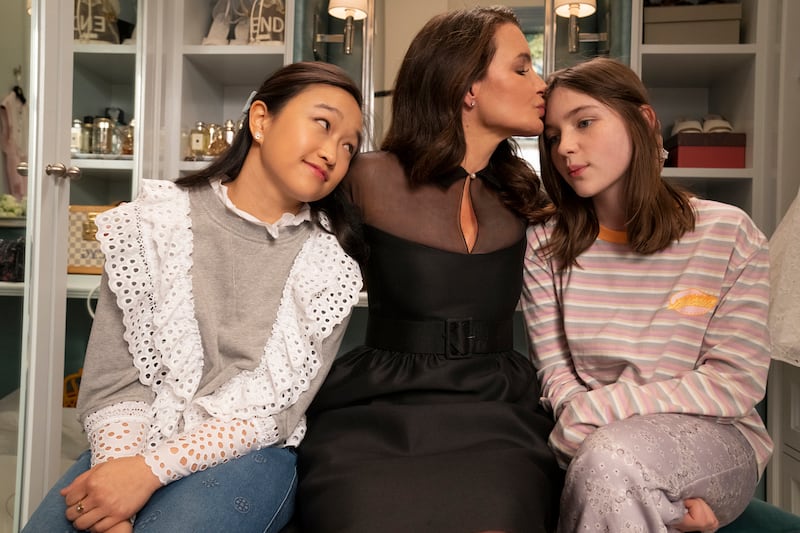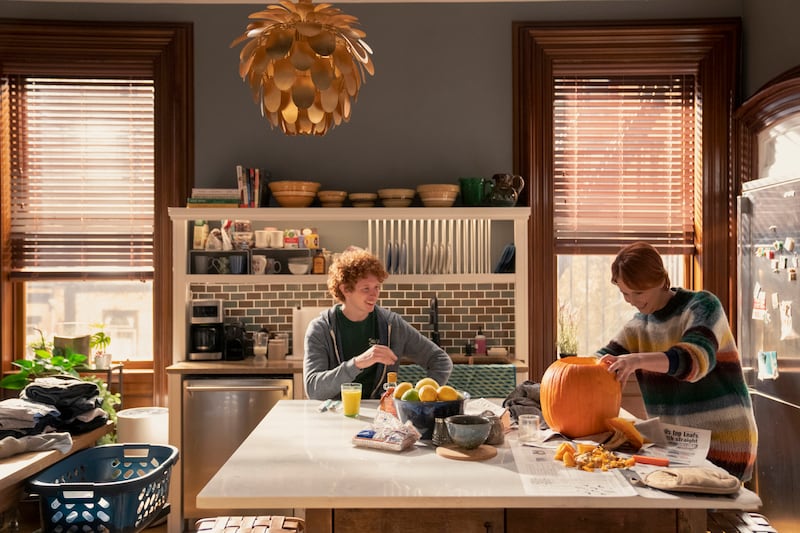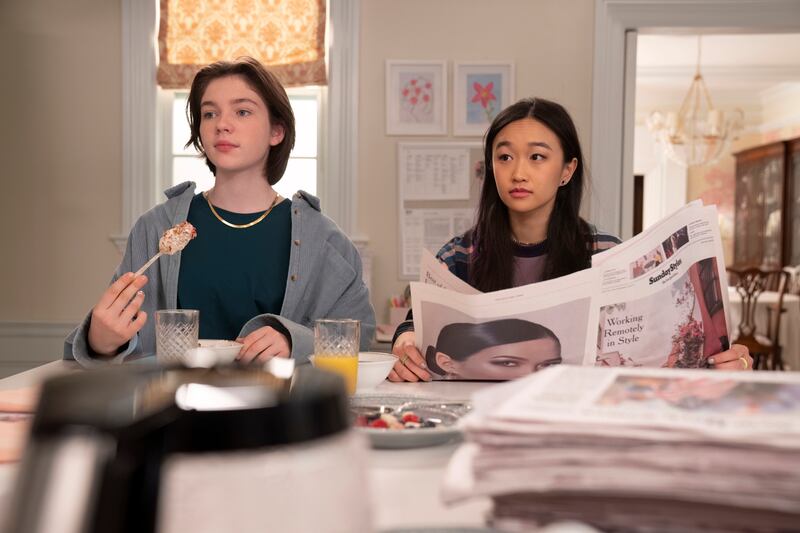As someone who has spent an alarming amount of time both watching and reading way too much into every minute detail of Sex and the City, I’ll admit I could never square one plot point: Why did Miranda Hobbes—an ambitious, explicitly child-averse attorney—suddenly choose to have a baby after an unexpected pregnancy? Given her fertility issues, it made sense for Miranda to wonder if this might be her one shot. But wasn’t this the same woman who once bought condoms as a baby shower gift, and who empathized with the witch who tried to eat Hansel and Gretel?
“Coulda, Woulda, Shoulda,” the Season 4 installment that unraveled Miranda’s decision, underscores a woman’s right to choose even as its central character decides not to proceed with an abortion. (And unlike the unexpected pregnancy episode in And Just Like That, this one actually used the word “abortion.”) Still, to this viewer, the idea that Miranda suddenly felt compelled to explore the wonders of motherhood felt a little unearned—as did her fear at the prospect of that door slamming shut.
At this point, however, it’s not just Miranda whose identity seems to have been subsumed by parenthood; on this season on And Just Like That, half her friends seem to be suffering from the same issue. As they look at everything they’ve sacrificed for their progeny, it seems the parents in this franchise can’t help but wonder the same thing Nathan Lane once sang on SATC: “Is that all there is?”
As suggested by the title, Sex and the City used characters’ relationships with physical intimacy as a kind of introductory shorthand; it placed each of its leads into an archetypal box early on, only to complicate them as it went along. Charlotte, the most politically conservative of the bunch, seemed like a prude in the beginning, but by the end, she turned out to be kinkier than Carrie—a sex columnist whom the show slowly revealed to be surprisingly reserved. Samantha, the most aggressively sexual of the bunch, bared her emotions later on through her loving, reciprocal relationship with model Smith Jerrod. And Miranda, a devout careerist, defied stereotypes about un-fun, sexless feminists with a lively and robust sexual Rolodex—save for a few dry spells.

And Just Like That still features a fair amount of sex—although it took a while for the series’ first season to let two adults get it on without dying afterward. Season 2 began and ended with sex montages set to music, and it even introduced the show’s first strap-on. So why does sex feel so ancillary this season—and why does everything suddenly seem to be about the kids?
Whereas Sex and the City followed the romantic lives of four young, successful women as they looked inward to discover who they were and what they needed—sexually and beyond—And Just Like That operates from a slightly different, perhaps more mature vantage point. Now, Carrie and her friends are learning how to meet those needs while balancing their many, many obligations to other people—often, their loving but needy children.
Miranda’s maternal instincts have not exactly wowed And Just Like That viewers, some of whom wonder how she could handle the divorce—and breaking the news to her son, Brady—so casually. For a while, Brady was having more sex in And Just Like That than any of the original cast members—loudly, and without so much as a request for discretion from his parents, who heard it all from another room. Had Miranda’s apathy toward her marriage permeated her relationship with her son as well?
This season, however, Miranda’s devotion to Brady played a key role in her break-up with Che Diaz. It was Brady’s emotional breakdown that prompted Miranda to fly back to New York from her sad life with Che in Los Angeles, and it was Brady who looked on while she finally made nice with Steve at his new Coney Island bar. Che even joked during a cruel, post-break-up stand-up routine that Miranda brought her son and her ex-husband, Steve, “into our bed” in an extremely unsexy kind of “foursome.”
Along with that tattoo Miranda got of her initials—a reminder of her career and all she accomplished—it seems that her son has become her most powerful touchstone. But that didn’t stop Steve from impugning her dedication to Brady during a nasty mid-season fight, in which he called back to Miranda’s abortion thoughts by saying that she “never” wanted Brady, or their home in Brooklyn, or him. It’s fascinating that while Miranda (messily, uncharacteristically) blew things up with Steve because her needs were going unmet, he used her uncertainty about parenthood as proof of her general selfishness. (For this viewer who’s admittedly loved Steve from the beginning, that line felt like downright character assassination—there’s no way that my Steve would make such a ghastly implication!)
But it’s not just Miranda whose maternal instincts complicate her search for a true, inner “self.” Her BFF Charlotte also ends this season on a mission to rediscover the star gallerist she sacrificed long ago to become a full-time homemaker and mother.

Sex naturally plays a role here, as the onetime Park Avenue princess teaches her husband kegel exercises to fix his dry ejaculation. But the bigger hurdle proves to be her children, who simply cannot seem to function without her help. One minute, Charlotte is stomping her way through a snowstorm to bring her daughter condoms; the next, she’s fielding a phone call from Rock at school and begging her husband Harry to please be the one to bring them their forgotten notebook this time. How could any woman recover her mojo (sexual or otherwise) under these strenuous conditions?!
Sex played a crucial role in Charlotte’s journey toward self-discovery on Sex and the City; in particular, her relationships with impotent men (both her husband Trey MacDougal and Kevin the Prozac guy in Season 1) proved to Charlotte just how sexual a being she was, “Madonna/Whore” complex be damned! These days, however, she’s got the sex down pat—she just needs her kids and husband to leave her alone so she can rediscover the rest of who she is.
Charlotte’s friend Lisa Todd Wexley seems to know exactly who she is, and where she wants to go: For her, the season revolves around her documentary, which she later learns PBS wants to expand into a 10-episode series. She and her husband, Herbert, also share a vibrant sex life rich with George Washington cosplay. (No kink shaming here!) Unfortunately for Lisa, Herbert and the three children they share are just as helpless as Charlotte’s brood—a constant drain on her time and energy that only grows more pronounced once Lisa finds out that she’s unexpectedly pregnant again.
Like other supporting characters added during And Just Like That Season 1, Lisa’s episodic comings and goings can sometimes feel a little scattershot; whereas Carrie, Miranda, and Charlotte’s story lines tend to play a role in a bigger arc, the show’s smaller characters don’t always receive such consideration. In the latter half of this season, however, the tension between Lisa’s ambitions and her familial obligations becomes unmissable. While Lisa is desperate to finish her work, which highlights Black women who made history, her family makes that task feel exhaustingly close to impossible.
But strangely (and unlike in Miranda’s accidental pregnancy episode) Lisa and her husband never once use the word “abortion” while discussing her options. “I thought about it, but I can’t,” Lisa says vaguely. “I mean, I’m really grateful that I have that option, but I just need to wrap my head around this new reality.”
More than any other episode of And Just Like That, this installment highlights the show’s shallow relationship with sex—and surprisingly, I found it left me with a newfound admiration for the depth of Miranda’s unexpected pregnancy story on Sex and the City.
When character after character condescendingly promised Lisa that she could handle a pregnancy she clearly did not want, I longed for a conversation like the one Miranda and her friends shared over brunch all those years ago on Sex and the City—in which both Carrie and Samantha casually confirmed they’d already had abortions. When And Just Like That took the cowardly route, saving Lisa with a miscarriage while refusing to explain her reluctance toward abortion, I suddenly appreciated the courage it took for Sex and the City to embrace the complexity of Miranda getting pregnant accidentally while her friend, Charlotte, struggled to conceive—a fate that Miranda could easily share one day, thanks to her own fertility issues.
While Sex and the City treated all aspects of physical intimacy as tools for character discovery, And Just Like That tends to flatten it all into plot fodder. Whereas Miranda’s pregnancy allowed her character to expand in ways none of us could have predicted, Lisa’s felt like a cheap misdirect. Meanwhile, Charlotte’s sexual escapades this season are mostly played for laughs, and Miranda’s relationship with Che felt less like the thoughtful complication of a character and more like knocking her down a peg for no reason. It doesn’t help that the people having the most sex this season—like the newly single Nya Wallace and Carrie’s friend Seema Patel, the show’s de facto replacement for Kim Cattrall’s Samantha Jones—are all supporting players who’ve never quite gotten their due as characters.
One might consider Anthony’s relationship with the young poet Giuseppe an exception to this rule, as Anthony learns to open up emotionally while also allowing himself to be penetrated for the first time. But even that development feels undercooked from a character perspective; while the series draws a clear parallel between the two experiences, it also neglects to show us much of that aforementioned emotional intimacy—apparently content to simply allude to it in passing.
More than the sexual relationships this season, it’s the parenting decisions that tell us most about who these characters are and what they value. For further proof, look no further than Carrie and Aidan—whose nostalgic love affair meets its inevitable end in a genuinely surprising twist.

We know precious little about how the make-up sex between Carrie and Aidan has been—she hasn’t even mentioned his “nook”!—but we do know that his kids have not been thrilled about this rebooted relationship. At least, his youngest son, the 14-year-old Wyatt, seems to really hate that his father jets off to New York every other week. In the end, Carrie and Aidan choose to hit pause when Wyatt gets into a car accident after stealing Aidan’s truck while intoxicated.
Carrie and Aidan rekindling their romance might be a tale as old as time, but it’s in this tragic moment that Carrie actually grows as a character.
When she first listens to Aidan sobbing over Wyatt’s accident on the phone, Carrie strikes a shockingly nonchalant note, telling him only, “It’ll be OK… breaks heal.” But when Aidan shows up at her apartment in the finale to tell her they can’t be together for five years—when his son, the only person he loves more than her, is no longer a teenager—she finally embraces empathy.
For once, in this moment, Carrie finally lets go of her expectations for the relationship and embraces Aidan for the devoted father he is. She accepts that for him, being a parent means putting her aside for now. To love him, truly love him, she understands that she must also place the needs of his son—a near stranger to her—above her own. It’s a stunning act of maturity for a character who seems to consider aging the ultimate humiliation. Here’s hoping we get more of that in Season 3—perhaps with an added bonus of deeper, more meaningful sex.
Keep obsessing! Sign up for the Daily Beast’s Obsessed newsletter and follow us on Facebook, Twitter, Instagram and TikTok.
Read more of our And Just Like That coverage HERE.






